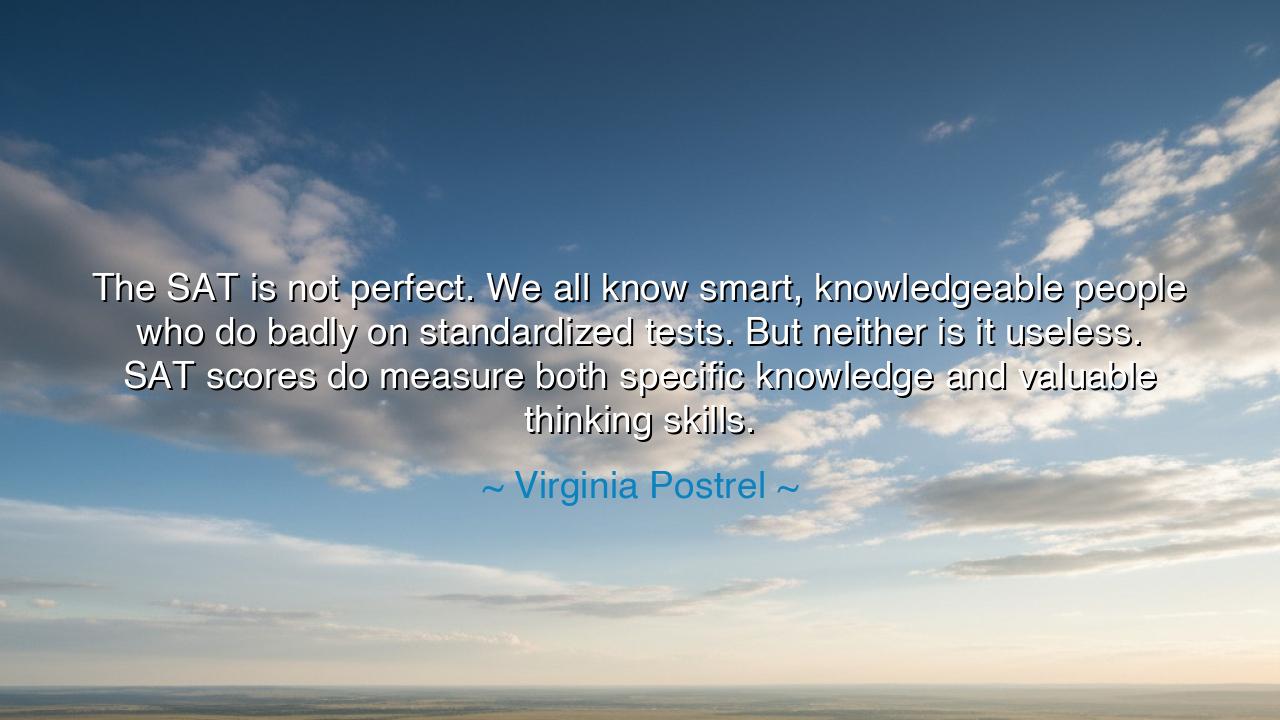
The SAT is not perfect. We all know smart, knowledgeable people
The SAT is not perfect. We all know smart, knowledgeable people who do badly on standardized tests. But neither is it useless. SAT scores do measure both specific knowledge and valuable thinking skills.






“The SAT is not perfect. We all know smart, knowledgeable people who do badly on standardized tests. But neither is it useless. SAT scores do measure both specific knowledge and valuable thinking skills.” — Virginia Postrel
In these words, Virginia Postrel, a thinker known for her balanced wisdom and clear reasoning, speaks to the enduring tension between measurement and mastery, between what can be tested and what cannot. Her quote addresses the SAT, that symbol of academic aspiration and anxiety in modern education — but beneath her calm assessment lies a greater truth: that no tool of judgment can ever capture the full measure of the human mind, and yet, some measures still hold value. She reminds us that imperfection does not mean futility, and that even flawed systems can reveal glimmers of truth when used with understanding and humility.
The origin of her reflection lies in the long debate over standardized testing, which began in the early 20th century as educators sought to create a common measure for college readiness. The SAT, born from the ideals of meritocracy, promised to judge students not by birth or wealth, but by intellect and preparation. Yet over the years, it became both a gateway and a gatekeeper — opening doors for some, closing them for others. Postrel’s words were written in the midst of that controversy, when many sought either to defend or to abolish the test entirely. But she, like the wise of old, chose the middle path: she acknowledged its faults without denying its value.
Her statement begins with humility — “The SAT is not perfect.” In this, she speaks a universal principle. All human instruments, whether tests, laws, or governments, are but approximations of truth, never the thing itself. The ancients, too, knew this: the philosopher Plato warned that human perception can only grasp shadows of the ideal. So it is with standardized tests — they reveal only a fragment of a student’s potential. They cannot measure creativity, empathy, or resilience; they cannot weigh the depth of curiosity or the courage to dream. Yet to dismiss them entirely, Postrel cautions, is to fall into the folly of rejecting all structure for the sake of purity. For truth often hides between the extremes.
Consider the story of Benjamin Bloom, the educator who created the taxonomy of learning that shaped modern teaching. He believed that intelligence is not fixed, that potential can be nurtured. Yet even he accepted that structured assessment — when used wisely — helps teachers understand how minds grow. In his view, tests were not judgments but mirrors, tools to reflect progress and reveal where guidance was needed. Postrel’s quote carries the same spirit: she sees the SAT not as a verdict, but as a signal, one that can illuminate both strengths and weaknesses when interpreted with care.
Her words also carry a moral warning to the arrogant and the bitter alike. To those who worship test scores as the measure of human worth, she whispers: remember humility, for wisdom cannot be confined to numbers. And to those who scorn all testing as oppression, she counsels: remember discernment, for structure and challenge refine the mind. “Neither is it useless,” she says — a reminder that progress depends on evaluation, and that evaluation, though flawed, is the crucible of growth. Like the swordsmith’s fire, it burns away illusion, revealing both the strength and the weakness of steel.
At its heart, Postrel’s statement is not about the SAT alone, but about the human pursuit of fairness and understanding. It is about how we measure what matters — and how we must balance reason with compassion in doing so. The specific knowledge a test captures is but one part of intelligence; the thinking skills it reveals — logic, interpretation, problem-solving — are another. Yet the unseen part, the soul of learning, remains immeasurable: the spark of curiosity, the hunger to know. The wise teacher sees all three — knowledge, skill, and spirit — as parts of a whole.
Therefore, let this teaching be spoken to every generation: Do not mistake the test for the truth, nor reject the test because it cannot contain all truth. Learn from it, but rise above it. Let every challenge, whether exam or hardship, refine you without defining you. Use structure to strengthen your skill, but let imagination be your guide.
For as Postrel reminds us, to learn is to live between imperfection and aspiration — to seek meaning within limits, and excellence within error. The SAT may not measure the heart, but it can still sharpen the mind; and the mind, once sharpened, can illuminate the world. Thus, take her wisdom as both caution and encouragement: embrace the tools of learning, but never let them become the masters of your worth.






AAdministratorAdministrator
Welcome, honored guests. Please leave a comment, we will respond soon